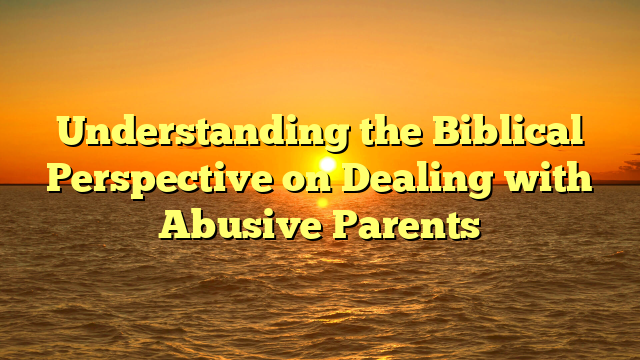Understanding the Biblical Perspective on Dealing with Abusive Parents
Introduction
Dealing with abusive parents can be an incredibly challenging and painful experience. It is important to seek guidance and support when facing such difficult circumstances. For those who turn to the Bible for answers, there are valuable insights and teachings that can provide comfort and direction. This article aims to explore the biblical perspective on dealing with abusive parents, offering guidance and encouragement for those in need.
The Importance of Honoring Parents
The Bible places a strong emphasis on honoring one’s parents. In the Ten Commandments, we are commanded to “honor your father and your mother” (Exodus 20:12). This commandment is reiterated in the New Testament as well (Ephesians 6:2). Honoring parents involves showing respect, obedience, and gratitude for the role they play in our lives.
However, it is important to note that honoring parents does not mean tolerating or enabling abusive behavior. The Bible also teaches us to love our neighbors as ourselves (Mark 12:31). This includes setting healthy boundaries and seeking justice when faced with abuse.
Recognizing Abuse
Abuse can take many forms, including physical, emotional, verbal, and sexual abuse. It is crucial to recognize the signs of abuse and understand that it is not acceptable or justified. The Bible teaches us that we are created in the image of God (Genesis 1:27) and that we should treat others with love and respect.
If you are unsure whether you are experiencing abuse, consider seeking guidance from a trusted counselor, pastor, or support group. They can help you assess your situation and provide the necessary support.
Seeking Safety and Support
When dealing with abusive parents, it is essential to prioritize your safety and well-being. If you are in immediate danger, do not hesitate to contact the authorities or a helpline specifically designed to assist victims of abuse.
Additionally, seek support from trusted friends, family members, or professionals who can provide guidance and assistance. The Bible encourages us to bear one another’s burdens (Galatians 6:2), and there are resources available to help you navigate through this difficult time.
Forgiveness and Healing
Forgiveness is a central theme in the Bible, and it can play a significant role in the healing process. However, forgiveness does not mean forgetting or condoning the abusive behavior. It is a personal choice to release the anger and resentment that can consume us.
Forgiveness can be a challenging journey, and it is important to remember that it does not require reconciliation with the abuser. It is possible to forgive while still maintaining healthy boundaries and protecting yourself from further harm.
God’s Love and Comfort
During times of pain and suffering, it is crucial to remember that God is with us and offers comfort and healing. The Bible assures us that God is close to the brokenhearted and saves those who are crushed in spirit (Psalm 34:18).
Through prayer, meditation on Scripture, and seeking solace in a supportive faith community, we can find strength and peace in the midst of difficult circumstances. God’s love is unconditional, and He desires to bring healing and restoration to our lives.
Conclusion
Dealing with abusive parents is a challenging and painful experience, but the Bible offers guidance and support for those in need. By understanding the importance of honoring parents while also recognizing the need for safety and boundaries, we can navigate through these difficult circumstances with wisdom and grace.
Seeking support from trusted individuals and relying on God’s love and comfort can provide the strength needed to heal and move forward. Remember, you are not alone, and there are resources available to help you on your journey towards healing and restoration.
Additional Resources
Here are some additional resources that may be helpful:
- Local helpline for victims of abuse
- Counseling services specializing in trauma and abuse
- Support groups for survivors of abuse
- Books on healing from abusive relationships
Table: Signs of Abuse
| Signs of Physical Abuse | Signs of Emotional Abuse | Signs of Verbal Abuse |
|---|---|---|
| Unexplained bruises or injuries | Constant criticism and belittling | Insults, name-calling, and humiliation |
| Frequent visits to the hospital | Isolation from friends and family | Threats and intimidation |
| Broken bones or fractures | Manipulation and control | Yelling and screaming |
